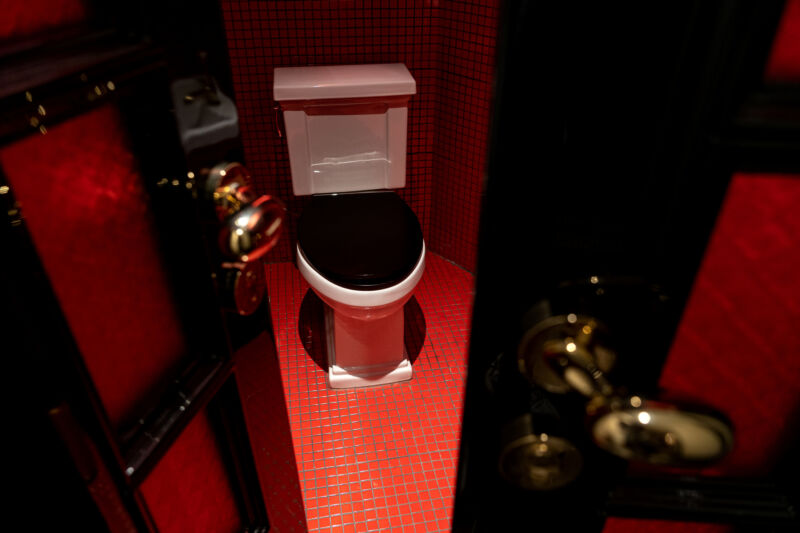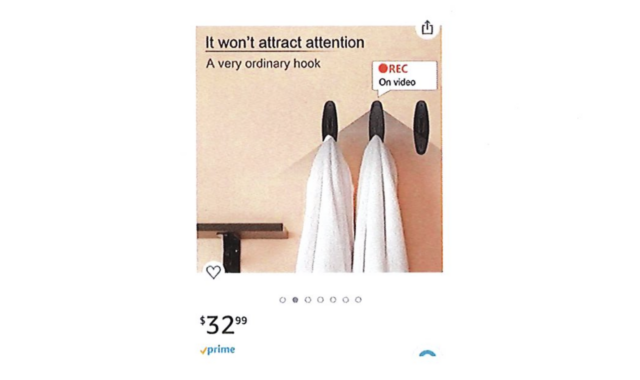
After a spy camera designed to look like a towel hook was purchased on Amazon and illegally used for months to capture photos of a minor in her private bathroom, Amazon was sued.
The plaintiff—a former Brazilian foreign exchange student then living in West Virginia—argued that Amazon had inspected the camera three times and its safety team had failed to prevent allegedly severe, foreseeable harms still affecting her today.
Amazon hoped the court would dismiss the suit, arguing that the platform wasn't responsible for the alleged criminal conduct harming the minor. But after nearly eight months deliberating, a judge recently largely denied the tech giant's motion to dismiss.
Amazon's biggest problem persuading the judge was seemingly the product descriptions that the platform approved. An amended complaint included a photo from Amazon's product listing that showed bathroom towels hanging on hooks that disguised the hidden camera. Text on that product image promoted the spycams, boasting that they "won't attract attention" because each hook appears to be "a very ordinary hook."

Because "Amazon approved product descriptions suggesting consumers use" the spycam "to record private moments in a bathroom," US district judge Robert Chambers wrote, "Amazon cannot claim shock when a consumer does just that."
"These allegations raise a reasonable inference Amazon sold a camera knowing it would be used to record a third party in a bathroom without their consent," Chambers wrote.
Perhaps most alarming to the plaintiff, Amazon's Product Safety Team specifically inspected the camera to "ensure" that Amazon wasn't platforming a product being used to “infringe privacy,” “surreptitiously record others for sexual purposes,” or “create and store child sex abuse material.” That review allegedly did not prevent the spy cam from being used to do just that, the lawsuit alleged, putting consumers at risk of alleged harms suffered by the plaintiff, including "chronic tremors, insomnia, headaches, nausea, hypotension with associated blurred vision, dizziness, compulsive overeating, avoidance behavior, and paranoia."
In addition to refusing blame, Amazon unsuccessfully argued that none of those harms could be considered physical injury. To the contrary, Chambers wrote that "if proven," the plaintiff's physical harms are considered "severe" because "emotional trauma inflicted during a child’s 'tender years' has an 'indelible effect' from which 'they may never recover.'"
A lawyer for the plaintiff, Lee Javins, told Ars that he thinks this is an important issue for the court to explore. He commended the court for making the right decision after taking its time "to provide a thorough legal analysis" on legal theories that he said "haven't come up a lot with today's technology."
A potentially “dangerous ruling” for spycam industry
The plaintiff hopes a jury will decide that Amazon "had wanton, conscious, reckless, and outrageous indifference to the health, safety, and welfare of children."
She has also alleged that Amazon "conspired" with the spycam seller to "market and distribute a defective product both knew was intended and used for illegal and criminal purposes." Not only did Amazon allegedly "shape" the "marketing and promotion of the camera" by controlling "how products are depicted and the content of product listings and descriptions," but Amazon also "boosted the camera’s sales" with its "specialized algorithms," the lawsuit alleged.
A loss for Amazon could put the online retailer on the hook for punitive damages. Amazon could also be ordered to stop selling the spycam used to harm the plaintiff and any products considered "identical" to that spycam. Chambers wrote that proving "foreseeability" of harms "is key" to defeating Amazon's defense.
Tech legal expert Eric Goldman wrote that a victory for the plaintiff could be considered "a dangerous ruling for the spy cam industry and for Amazon," because "the court’s analysis could indicate that all surreptitious hook cameras are categorically illegal to sell." That could prevent completely legal uses of cameras designed to look like clothes hooks, Goldman wrote, such as hypothetical in-home surveillance uses.
Now, discovery will proceed as the plaintiff can argue her case at trial. The trial could shed more light on "what Amazon’s Product Safety team thought when it evaluated this item," Goldman wrote.
Currently, Amazon advertises several "clothes hook hidden camera" products when users search for "bathroom spy camera," an Ars search found, but it's unclear if the spy cam at the center of this lawsuit is still available on Amazon.
In his blog, Goldman pointed to an Amazon online listing that appeared to be the spycam in question. However, Javins told Ars that while that particular listing looked like the "same type of camera," it had a different product description from the spycam sold in the case, where "the whole vibe" of the listing "was just kind of creepy."
Ars unsuccessfully attempted to contact Amazon for comment on the judge's order and the online listing Goldman found. Shortly after submitting that request, Amazon appears to have removed the online listing but has not yet offered Ars any explanation.
reader comments
241